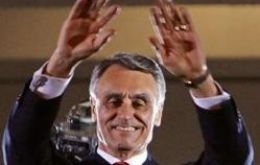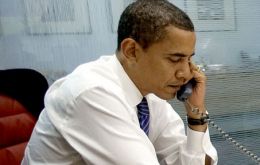MercoPress. South Atlantic News Agency
Tag: Portugal
-
Monday, April 18th 2011 - 21:51 UTC
Finland’s anti-Euro strong showing could block Portugal’s bailout negotiation

What’s the link between Portugal's bailout negotiations and Finland? Well negotiations began under a cloud Monday after an anti-Euro party scored big gains in a Finnish election and immediately vowed to derail the pending rescue.
-
Thursday, April 7th 2011 - 09:11 UTC
Portugal admits the facts, formally requests a bailout from the EU

Portugal's caretaker government said on Wednesday it had decided to seek financing from the European Union in an abrupt turnaround after resisting a bailout for months despite sharply deteriorating financial conditions.
-
Monday, March 28th 2011 - 01:15 UTC
Rousseff and Lula da Silva together in Portugal ‘day-after’ Iran vote

Brazilian president Dilma Rousseff and her predecessor Lula da Silva will be meeting this week for an international event in Portugal, just a few days after the new government abandoned a pro-dialogue with Iran position for a more neutral stance.
-
Thursday, March 24th 2011 - 19:59 UTC
Portugal has Euro zone on the brink; bail out package considered at EU summit

EU leaders are grappling with a new Euro zone threat after Portugal's parliament rejected an austerity budget and PM Jose Socrates resigned. The vote means an international bail-out, similar to those accepted by Greece and the Irish Republic last year, is now far more likely.
-
Sunday, January 23rd 2011 - 22:43 UTC
Exit Polls Show Portuguese Leader Cavaco Silva is Re-elected

Portuguese voters Sunday re-elected Anibal Cavaco Silva for a second term in office, showing that they want political stability. However, there are difficult months ahead asd the country has to face up to the European Union crisis.
-
Wednesday, December 22nd 2010 - 05:06 UTC
Portugal on notice for possible credit rating cut in next three months

Portugal was put on notice that its credit rating could be cut and fellow Euro zone debtor Spain had to pay more to issue new debt, suggesting the currency bloc's crisis will rage unabated in 2011.
-
Wednesday, August 4th 2010 - 01:21 UTC
Uruguay’s exports in seven months increase 23% and reach 3.9 billion USD

Uruguayan exports increased 22.78% during the first seven months of 2010 compared to the same period a year ago, according to Uruguay’s Union of Exporters. Sales totalled 3.9 billion US dollars while in the seven months of 2009, they reached 3.2 billion USD.
-
Friday, May 14th 2010 - 04:40 UTC
Portugal Joins Euro Belt-Tightening Bandwagon but with Strong Political Support

Portugal has become the latest country to introduce austerity measures, after both Greece and Spain took similar steps to stabilize public finances in the face of massive debt.
-
Wednesday, May 12th 2010 - 07:09 UTC
World Markets Lower After Taking a Second Look at Euro Rescue Plan

United States shares closed lower on Tuesday as global stock markets stalled on niggling worries over European debt problems. On Wall Street, the Dow Jones index closed down 0.34% following a turbulent day's trading, and a nearly 4% rise on Monday.
-
Wednesday, May 12th 2010 - 03:54 UTC
IMF: Euro Countries Must Focus on Cutting Deficits; Denies “Blanket Commitment”

European countries saddled with debt should focus on cutting deficits in the wake of policy makers' unprecedented efforts to contain the region's sovereign-debt crisis, said John Lipsky from the International Monetary Fund.
